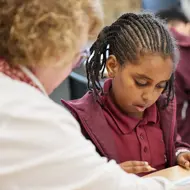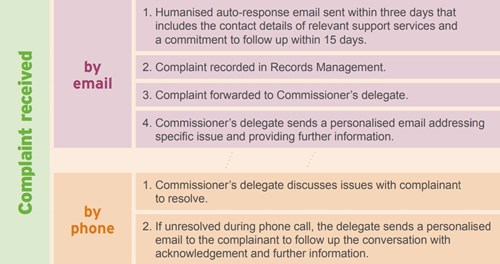Agency Performance - Deliver organisational best practice
Deliver organisational best practice
Staff development
Planning
Staff training and development is a high priority for the Commissioner. In October 2023, the team embarked on a transformative journey towards shaping the future of our organisation through a strategic planning week. Facilitated by esteemed experts Dr. Lynda Folan from Inspired Development and Mandy Gadsdon from Think Culture, this week-long workshop proved to be a pivotal moment in our collective pursuit of excellence.
From 9-13 October 2023, staff members actively engaged in dynamic discussions, innovative brainstorming sessions, and collaborative exercises aimed at charting our course for the years ahead. With Dr. Folan and Ms. Gadsdon’s guidance, we delved into every aspect of our organisation’s mission, vision, and values, laying the foundation for the Commissioner for Children and Young People’s Strategic Plan 2024-2027.
This strategic planning week served as a catalyst for individual and team growth. By aligning our organisational objectives with personal and professional aspirations, we developed not only the Commissioner’s Strategic Plan but also tailored business plan, team plans, and individual professional development plans.
This inclusive approach to strategic planning fostered a sense of ownership and commitment among all staff members. By providing an opportunity for everyone to contribute to the development of our strategic direction, we ensured buy-in and a shared vision for the future. Furthermore, the emphasis on individual professional development plans underscored our commitment to nurturing the talents and skills of our team members, paving the way for continued growth and success in the years to come.
Training
The Policy team has been provided with valuable opportunities to further enhance their professional development and training through various externally offered online webinars and face to face attendance at Institute of Public Administration (IPPA) offered Policy in Practice and Writing for Government.
An opportunity arose for further professional development for the ‘Sharpening your teeth’ training hosted by Tasmania’s Commissioner for Children and Young People, facilitated by the Canadian Ontario’s Ombudsman’s Office in Hobart, Tasmania. This training specifically focussed on sharing best practice in conducting robust systemic investigations to influence better outcomes for agencies responsible for delivering child protection and youth justice supports and services.
Complaints handling
Monitoring complaints regarding children and young people
It is a requirement of the Commissioner for Children and Young People Act 2006 to monitor trends and complaints made by or on behalf of, children and young people.
While there is no capacity in the legislation for the Commissioner to advocate on an individual basis, she can advocate for systemic change.
The complaints monitoring process allows her to identify in real time, significant issues and trends that arise related to children and young people.
Over the past 12 months 165 complaints were received and all were made by individuals over the age of 18. No complaints were received from children or young people.
Only 10 (6%) of these complaints directly related to the Commissioner and her work. Four of these complaints related to her comments about young people in detention; three were associated with children involved in incidents in Applecross, Broome and Geraldton; two concerned general support for First Nations peoples and the Stolen Generations; and one about contacting the Commissioner by phone.
The majority (94%) of complaints received in 2023/24 were objections to actions taken by government agencies, organisations or individuals, in relation to the safety and wellbeing of specific children and young people.
An easy-to-read complaints flowchart is available on the Commissioner’s website explaining the process in easily understandable language and visuals. This is also sent to the complainant when they are under 18 years old.
For those that seek more detailed information, links to the Commissioner’s complaint policies are clearly listed on the relevant webpage.
Given the nature of complaints and particularly those that involve children and young people, it is extremely important that conversations and the auto-response are ‘humanised’ – i.e. that personable language is used and the complainant’s commitment to improving the wellbeing and safety of children and young people is acknowledged.
All communication is grounded in inclusivity and respect for diversity of cultures, genders, backgrounds and ages.
Every opportunity is taken to encourage children and young people that their voice matters and their complaints should be heard. The Commissioner distributes information wherever it is possible and relevant – particularly through her events and activities in schools, colleges and forums.
Two child-friendly publications have been developed collaboratively about the process. The ‘How to make a complaint’ brochure with the National Office for Child Safety and the First Nations focused ‘Speak Up’ poster with the students of Roebourne District High School.
Everyone who would like to make a complaint to the Commissioner has the option of doing so in-person, online, by phone or letter.
As every complaint is investigated, we identify ways to improve the process and actions that may stop the same or similar problems from happening again.
Many calls and emails received are not actually complaints that lie within the Commissioner’s remit to deal with. As such, we provide a comprehensive list of relevant support services and the contact details of complaint channels for government agencies and the WA Ombudsman.
We do supported introductions to new services or providers where needed and have protocols established with some government agencies for escalation of urgent matters where children and young people are at immediate risk.
Sector audit
Under the Commissioner for Children and Young People Act 2006, the Commissioner is required to monitor trends in complaints by children and young people to government agencies. The Commissioner is also required to monitor the way in which a government agency investigates a complaint made by a child or young person.
In 2024, the Commissioner surveyed government agencies on their complaints systems and the complaints received from children and young people. The information provided will strengthen the ability of the Commissioner to identify systemic issues affecting the wellbeing of children and young people. It will also ensure that children and young people feel heard, safe and supported to make complaints to agencies.
The results are to be published in late 2024.
More on Agency Performance
Read other pages in the Agency Performance chapter









